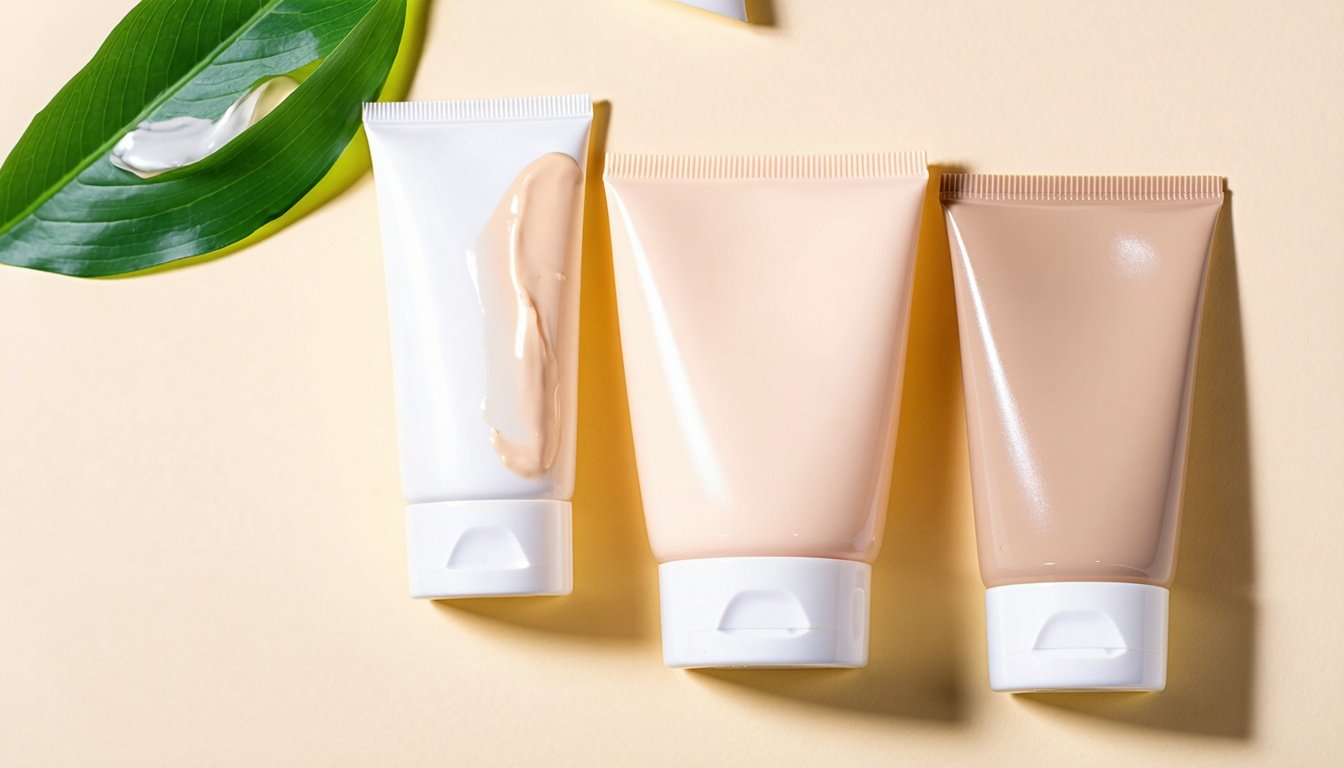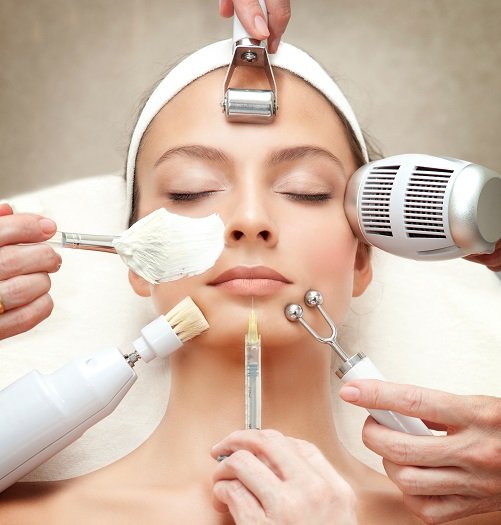Importance of Daily SPF Use
Year-Round Protection
You might think sunscreen is just for those blazing summer days, but your skin needs protection all year long. Even when it’s cloudy or chilly, those sneaky UV rays can still get through and mess with your skin. The Mayo Clinic says only 14% of folks slap on sunscreen daily, even though 1 in 5 Americans might face skin cancer by 70. Yikes!
Using something like POND’S® Clarant Even Skin Tone Daily Moisturizer with SPF 30 is a smart move. It keeps your skin tone even and gives you that sun shield you need (Ponds).
| Month | UV Index Level | Recommended SPF |
|---|---|---|
| January | 2 | 15 |
| April | 5 | 30 |
| July | 8 | 50 |
| October | 3 | 15 |
Benefits of SPF Moisturizers
Slapping on a face moisturizer with SPF is like hitting two birds with one stone. It hydrates your skin and keeps those pesky sun rays at bay. This two-in-one product helps you get that glow while making sure you’re not getting sunburned.
SPF moisturizers do more than just hydrate. They help keep those wrinkles and age spots away, thanks to their UV-fighting powers. Go for a broad-spectrum sunscreen with at least SPF 15 to keep your skin happy and healthy (FDA).
Adding SPF moisturizers to your daily routine can seriously cut down your skin cancer risk and make your skin look fab. For more tips, check out our list of the top 10 best SPF products for your face in 2025 and dermatologist recommended SPF.
Factors to Consider in SPF Moisturizers
Picking the right SPF moisturizer for your daily routine is like finding the perfect pair of jeans—it’s gotta fit just right. You want to think about the SPF level, broad-spectrum coverage, and how well it hydrates your skin. Getting these right means your skin will thank you later.
SPF Level
SPF, or Sun Protection Factor, is like your skin’s bodyguard against sunburn. The higher the number, the better the protection, up to SPF 50. Experts suggest going for a broad-spectrum sunscreen with at least SPF 15 to keep those pesky UV rays at bay (FDA). Dermatologist Dr. Marisa Garshick recommends aiming for SPF 30 or more in your moisturizer to really shield your skin from harm (People).
| SPF Level | Protection Duration (Approx.) |
|---|---|
| SPF 15 | 150 minutes |
| SPF 30 | 300 minutes |
| SPF 50 | 500 minutes |
Broad-Spectrum Coverage
Think of broad-spectrum sunscreens as the all-in-one package deal—they guard against both UVA and UVB rays. UVA rays are the sneaky ones that age your skin, while UVB rays are the culprits behind sunburn. To keep your skin safe, make sure your sunscreen covers both. And don’t forget to throw on a hat or find some shade when the sun’s blazing (FDA).
Skin Hydration
Sun protection is great, but your skin also craves hydration. A solid SPF moisturizer should do double duty—shielding you from the sun and keeping your skin nice and moist. Products like Neutrogena Hydro Boost Hyaluronic Acid Moisturizer SPF 50 are champs at this, thanks to ingredients like hyaluronic acid that lock in moisture while offering high SPF protection (People).
When you’re on the hunt for an SPF moisturizer, look for goodies like glycerin, aloe vera, or natural oils. These will help keep your skin’s moisture levels in check while fending off sun damage.
By keeping an eye on these factors—SPF level, broad-spectrum coverage, and skin hydration—you’ll be well on your way to finding the best SPF moisturizers for your daily grind. For more tips, check out our list of the top 10 best SPF products for your face in 2025 or see what the dermatologists recommend.
Top SPF Moisturizers for Everyday Use
Picking the right SPF moisturizer can really shake up your skincare game. Here are some top picks that might just become your new best friend in the daily routine.
Neutrogena Hydro Boost Hyaluronic Acid Moisturizer SPF 50
This one’s a crowd-pleaser with its feather-light feel and solid SPF punch. Neutrogena Hydro Boost packs hyaluronic acid, which is like a tall drink of water for your skin, while shielding it from those pesky UV rays. It’s a go-to for daily use, especially if your skin’s feeling parched.
| Feature | Details |
|---|---|
| SPF Level | 50 |
| Key Ingredient | Hyaluronic Acid |
| Skin Type | All skin types |
Curious? Dive into People’s review.
Oars + Alps Everyday Face Moisturizer
Oars + Alps brings you a nifty moisturizer that marries hydration with SPF protection. It’s light as a feather and won’t leave you feeling like a greaseball, making it a match for all skin types. Plus, it’s got natural goodies to pamper your skin.
| Feature | Details |
|---|---|
| SPF Level | 30 |
| Key Ingredient | Natural Extracts |
| Skin Type | All skin types |
Get the scoop in InStyle’s article.
Cay Skin Isle Glow Face Moisturizer
Cay Skin’s Isle Glow is your ticket to a sun-kissed glow. This moisturizer not only guards against UV but also gives your skin a little sparkle. It’s loaded with ingredients that keep your skin happy and healthy.
| Feature | Details |
|---|---|
| SPF Level | 30 |
| Key Ingredient | Glow-Enhancing Ingredients |
| Skin Type | All skin types |
For more info, check out People’s review.
Paula’s Choice Resist Skin Restoring Moisturizer
Paula’s Choice is a legend in skincare, and this moisturizer lives up to the hype. It offers SPF protection while helping to keep your skin’s moisture barrier in tip-top shape. Perfect for mature skin, it also works on those pesky fine lines.
| Feature | Details |
|---|---|
| SPF Level | 50 |
| Key Ingredient | Antioxidants |
| Skin Type | Normal to Dry Skin |
For the lowdown, visit People’s review.
Kiehl’s Ultra Facial Cream
Kiehl’s Ultra Facial Cream is a classic that delivers hydration and SPF protection like a champ. It’s designed to keep your skin quenched for a full day while fending off UV nasties. Works for all skin types, but it’s a lifesaver in dry weather.
| Feature | Details |
|---|---|
| SPF Level | 30 |
| Key Ingredient | Squalane |
| Skin Type | All skin types |
For more details, check out InStyle’s article.
Adding one of these top SPF moisturizers to your daily lineup can help keep your skin safe from sun damage while staying hydrated and fresh. For more picks, explore our list of top 10 best spf products for your face in 2025 or check out dermatologist recommended spf.
Differences Between Sunscreen and SPF Moisturizers
Alright, let’s break down the sunscreen vs. SPF moisturizer debate. Both are your buddies in the sun protection game, but they play their roles a bit differently. Knowing what sets them apart can help you pick the right one for your skin.
Effectiveness Comparison
Here’s the scoop: SPF moisturizers might not be as tough as regular sunscreen. A study by the British Association of Dermatologists found that folks using sunscreen had better UV protection than those using SPF moisturizers. The sunscreen users showed up darker in UV photos, meaning they were better shielded from the sun’s rays (Teen Vogue).
| Product Type | Effectiveness |
|---|---|
| Sunscreen | Stronger UV protection |
| SPF Moisturizer | Weaker UV protection |
Coverage Areas
Coverage is key, and it turns out SPF moisturizers might leave you hanging. Research shows that people using SPF moisturizers missed more spots on their face compared to sunscreen users. The eyelids, in particular, were often left out with both products. So, make sure you’re covering all your bases, especially those sneaky spots.
| Coverage Area | Sunscreen | SPF Moisturizer |
|---|---|---|
| Eyelids | Better coverage | Not so great |
| Overall Face | More thorough | Misses spots |
Skin Type Considerations
SPF moisturizers can be thicker than sunscreen, making them a bit tricky to spread evenly. This can lead to patchy coverage (NCBI). Plus, your skin type matters. Sensitive skin folks might lean towards sunblock, which skips the chemical stuff that can cause irritation (HealthPartners).
| Skin Type | Recommended Product |
|---|---|
| Sensitive Skin | Sunblock |
| Normal to Oily Skin | Sunscreen or SPF Moisturizer |
Picking the right product for your skin and applying it properly can make a big difference in your sun protection routine. Want more tips? Check out our list of top 10 best spf products for your face in 2025 and dermatologist recommended spf.
Understanding SPF and Sun Protection
Alright, let’s talk about SPF and how it keeps your skin safe from the sun’s sneaky rays. We’ll dive into SPF numbers, why broad-spectrum sunscreens are your best buddies, and some handy tips for slathering on sunscreen like a pro.
SPF Values and Protection Levels
So, SPF stands for Sun Protection Factor, which is basically a measure of how well a sunscreen can prevent sunburn. The higher the SPF, the better it is at keeping those pesky UVB rays at bay. Aim for a sunscreen with at least SPF 15 to keep your skin happy and healthy.
| SPF Value | Protection Level |
|---|---|
| 15 | Blocks about 93% of UVB rays |
| 30 | Blocks about 97% of UVB rays |
| 50 | Blocks about 98% of UVB rays |
Curious about the top SPF products? Check out our article on top 10 best SPF products for your face in 2025.
Broad-Spectrum Sunscreens
Broad-spectrum sunscreens are like the superheroes of sun protection. They shield you from both UVA and UVB rays. UVA rays are the ones that make your skin look older before its time, while UVB rays are the culprits behind sunburn. So, grab a broad-spectrum sunscreen and pair it with a hat and some shade, especially when the sun’s doing its thing.
Sunscreen Application Tips
Want to make sure your sunscreen does its job? Follow these tips:
- Apply Generously: Think of it like a mini spa day. Use about a shot glass full to cover your whole body. For your face, a nickel-sized dollop should do the trick.
- Reapply Regularly: Keep it coming every two hours, or more often if you’re swimming or sweating. Sunscreen is only your friend if you keep it fresh.
- Apply Before Sun Exposure: Give it a head start by applying at least 15 minutes before you step outside. Let it soak in and do its magic.
- Check Expiration Dates: Sunscreens can lose their mojo over time, so make sure they’re still good to go before you use them.
By getting the hang of SPF values, picking broad-spectrum champs, and applying sunscreen like a boss, you’ll keep your skin safe from those pesky UV rays. For more tips, check out our section on dermatologist recommended SPF and find the best tinted SPF for every skin tone.
Mineral vs. Chemical Sunscreens
Picking the right sunscreen can feel like a game of “eeny, meeny, miny, moe” with two main players: mineral and chemical. Knowing what sets them apart can help you snag the perfect SPF sidekick for your daily glow-up.
Zinc Oxide and Titanium Dioxide
Mineral sunscreens, or sunblock as your grandma might call it, pack a punch with zinc oxide and titanium dioxide. These are the go-to for folks with skin that throws a tantrum at the slightest provocation. They act like a shield, bouncing those pesky UV rays right off your skin, covering both UVA and UVB rays. The moment you slap it on, you’re good to go, but beware of the ghostly white tint it might leave behind.
| Ingredient | Type | Protection | Application Time |
|---|---|---|---|
| Zinc Oxide | Mineral | UVA & UVB | Instant |
| Titanium Dioxide | Mineral | UVA & UVB | Instant |
If the Casper look isn’t your thing, don’t sweat it. Many brands now offer tinted versions, and a dab of petroleum jelly can tone down the white-out effect (Mayo Clinic).
Physical vs. Chemical Protection
Chemical sunscreens are like the undercover agents of the sunscreen world. They sneak into your skin, soak up UV rays, and turn them into heat, which then gets released. But, they need a good 20 minutes to kick in and demand more frequent touch-ups when you’re basking in the sun.
| Type | Mechanism | Effectiveness | Re-application |
|---|---|---|---|
| Mineral | Blocks UV rays | Instant | As needed |
| Chemical | Absorbs UV rays | 20 minutes | More often |
These chemical concoctions can clog pores, making them a no-go for acne-prone skin. Plus, they might not play nice with sensitive skin, rosacea, or hyperpigmentation (HealthPartners).
Skin Sensitivity and Allergies
Got skin that acts like a drama queen? Mineral sunscreens with zinc oxide and titanium dioxide are your best bet. They offer solid protection from UVA and UVB rays without the drama of irritation that some chemical sunscreens might stir up (Mayo Clinic).
Picking the right sunscreen is like finding the perfect pair of jeans—it’s all about the fit. For more scoop on top-notch products, check out our list of top 10 best SPF products for your face in 2025 and dermatologist recommended SPF.





















